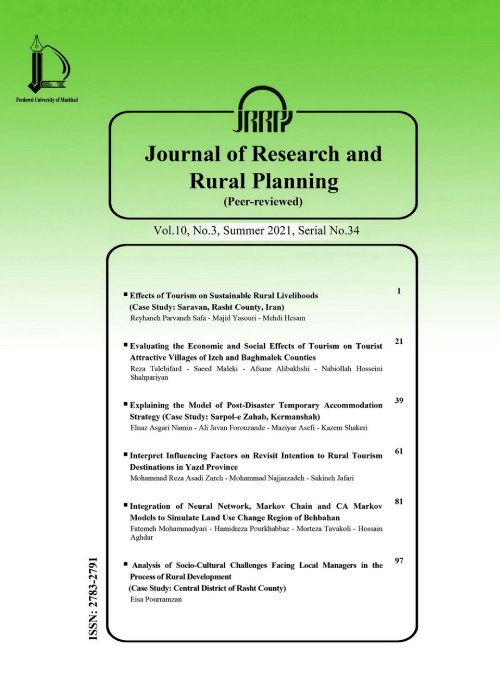Determinate of Factors Influencing Intention to Stay and Reside in Rural among Rural Students
Author(s):
Abstract:
1.
2. THEORETICAL FRAMEWORK: According to various studies, several factors influence the intention to stay in a rural. A literature review showed that the Image of Rural, Attitude toward rural areas, the feeling of Belonging to the rural, the Moral and Subjective Norms, Perceived Behavioral Control, Identity, Perceived Value of Life in the rural and Satisfaction are the factors influencing the intention to stay in the rural.
3.
4.
5.
Introduction
Many rural areas of the Iran experienced population decline due to out-migration. rural to urban migration have had consequences on social, economic, and political issue. On the other hand, Mobility rates were found to be highest for people between the ages of 16 and 29 years. Within this age group, the likelihood of leaving home increases as age increases. Also the research's has shown that young people who possess higher levels of formal education tend to move out of rural communities. Therefore, Youth out-migration is a common feature of most rural areas in both developed and developing countries. In other words, Should I stay or should I leave my home region? is one of the key life course questions that many young people must address as they grow to maturity. Consistent with the theory of reasoned action, migration intentions have in General been found to be a moderate to strong predictor of actual migration in various societies around the world. Understanding migration intentions is a difficult task, as decisions to migrate often reflect the influence of a range of factors in both origin and destination communities. Therefore, identify the influencing factors on willingness of youth to stay in their rural is important. So this study was designed to Investigate of the factors influencing on youth intention in order to stay in rural.2. THEORETICAL FRAMEWORK: According to various studies, several factors influence the intention to stay in a rural. A literature review showed that the Image of Rural, Attitude toward rural areas, the feeling of Belonging to the rural, the Moral and Subjective Norms, Perceived Behavioral Control, Identity, Perceived Value of Life in the rural and Satisfaction are the factors influencing the intention to stay in the rural.
3.
Methodology
This study is an applied research and with the survey method was conducted. Target population of this study consisted of 420 graduated students. Using a simple Quota random sampling method, 200 students were selected for this study. The sample size was determined using the Morgan table. The study site is Ramin agricultural university in the Khuzestan province. Data were collected through a questionnaire based on the conceptual model. The face validity of the questionnaire was confirmed by a panel of experts. The survey was pre-tested and piloted on 30 students from outside the study area. This procedure highlighted any unclear sections of the questionnaire. Cronbach alpha reliability coefficients were calculated for the pilot study and used to refine the questions for the final questionnaire. All scales indicated good-to-excellent reliability, generally 0.700.85.4.
Discussion
The results revealed a positive significant relationship between intention to stay and attitude, perceived behavioral control and subjective norm. Moreover, the results revealed that self- identity, Image of rural, Belonging, moral norm, perceived value and satisfaction had negative significant relationship with intention. The regression showed that image of rural, attitude, perceived behavioral control and subjective norm are significant predictors of intention. These four variables predicted 58% of the variance in intention to stay. (sig=0/0001, F= 23/10, R2 Adjust = 0/55). perceived behavioral control is a key predictor of intention. perceived value and belonging were significant predictors of satisfaction. These two variables predicted 52% of the variance in satisfaction (sig=0/0001, F= 58/23, R2 Adjust = 0/51).5.
Conclusion
The results revealed that image, attitude, perceived behavior control and subjective norm are having an impact on stay intention. From a practical point of view, the present study provides a justification for using attitude, Image, perceived behaviour control and subjective norm dimensions in policies and programs that intend to decrease young people to migrant from rural area. a positive attitude towards rural living is a good starting point to stimulate willingness to remain in rural area. This relationship has received substantial empirical support (see Yazdanpanah & Zobeidi., 2017; Yazdanpanah et al, 2015; Liao et al., 2007). Furthermore, perceived behavior control refers to the grade to which an individual feel that the performance of behavior is under his/her volitional control. In line with findings of other studies (Liao et al., 2007), the Perceived behavior control was a determinant (main predictor) of intention. Moreover, our study unlike other studies (Yazdanpanah et al, 2015), revealed that moral norms were not a significant predictor of intention. therefore, attempts to encourage young people to stay in rural areas should focus on improving image of rural, attitude, perceived behavioral control and subjective norms.Keywords:
Language:
Persian
Published:
Journal of Research and Rural Planning, Volume:6 Issue: 3, 2017
Pages:
105 to 117
magiran.com/p1761626
دانلود و مطالعه متن این مقاله با یکی از روشهای زیر امکان پذیر است:
اشتراک شخصی
با عضویت و پرداخت آنلاین حق اشتراک یکساله به مبلغ 1,390,000ريال میتوانید 70 عنوان مطلب دانلود کنید!
اشتراک سازمانی
به کتابخانه دانشگاه یا محل کار خود پیشنهاد کنید تا اشتراک سازمانی این پایگاه را برای دسترسی نامحدود همه کاربران به متن مطالب تهیه نمایند!
توجه!
- حق عضویت دریافتی صرف حمایت از نشریات عضو و نگهداری، تکمیل و توسعه مگیران میشود.
- پرداخت حق اشتراک و دانلود مقالات اجازه بازنشر آن در سایر رسانههای چاپی و دیجیتال را به کاربر نمیدهد.
In order to view content subscription is required
Personal subscription
Subscribe magiran.com for 70 € euros via PayPal and download 70 articles during a year.
Organization subscription
Please contact us to subscribe your university or library for unlimited access!


